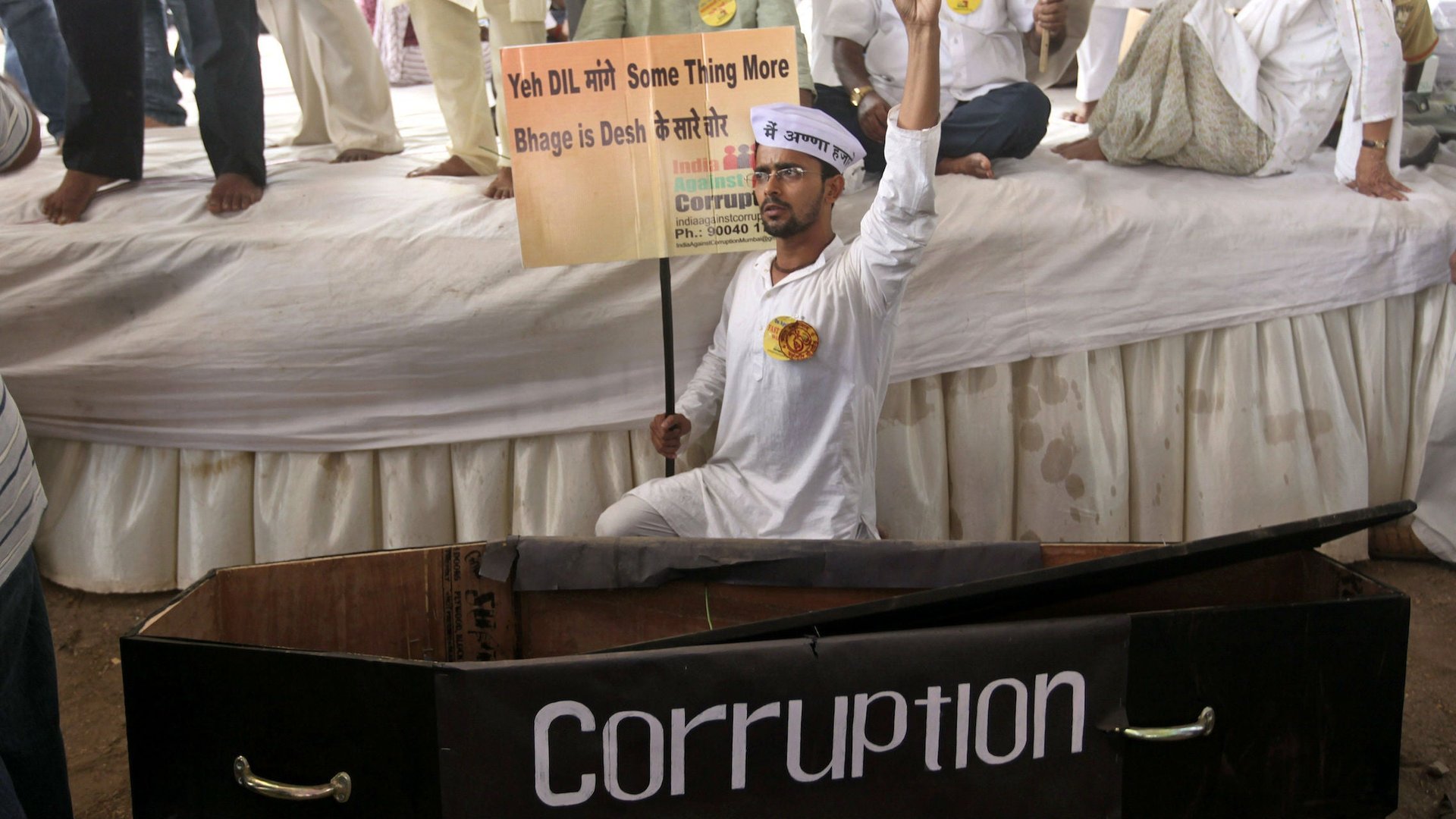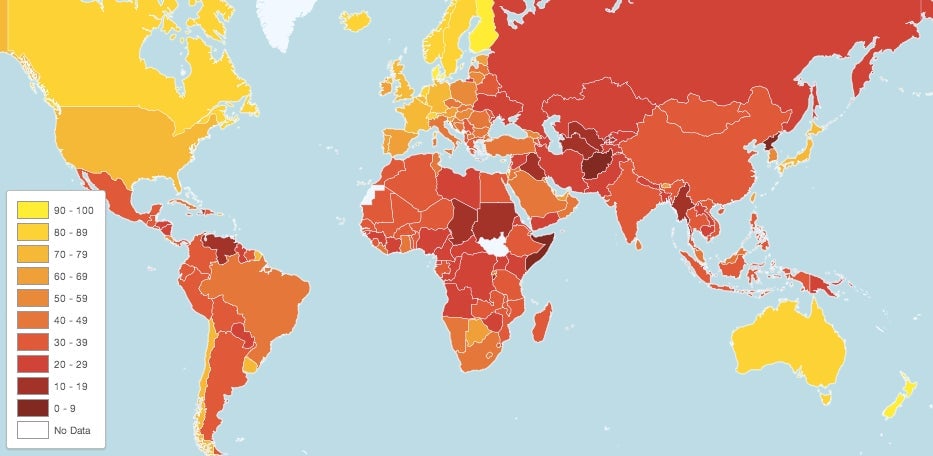How to deal with corruption in India (and any other emerging market)
One of the worst things that can happen to a big company in an emerging market is to get caught greasing an official’s palm. Firms working in places like India, China, and Russia risk breaking anti-corruption laws both there and in their own countries. Cadbury India, a unit of US sweets conglomerate Mondelez International, is under investigation (paywall) for allegedly creating a fictitious factory to dodge taxes, with the collusion of local officials. Wal-mart is investigating bribery allegations involving its staff in India that might violate the US Foreign Corrupt Practices Act.


One of the worst things that can happen to a big company in an emerging market is to get caught greasing an official’s palm. Firms working in places like India, China, and Russia risk breaking anti-corruption laws both there and in their own countries. Cadbury India, a unit of US sweets conglomerate Mondelez International, is under investigation (paywall) for allegedly creating a fictitious factory to dodge taxes, with the collusion of local officials. Wal-mart is investigating bribery allegations involving its staff in India that might violate the US Foreign Corrupt Practices Act.
But Ravi Venkatesan, former chairman of Microsoft India and Cummins India, explains in a new book, ”Conquering the Chaos: Win in India, Win Everywhere,” that corruption is a risk that can be managed. We put some questions to him on how to do that.
Quartz: You list four types of corruption in the emerging market world: bribery and extortion at the hands of officials, “speed money”, or illegal payment demanded for routine business dealings like getting permits or clearance for a shipment, and fraud by employees. How does one get around having to pay bribes to government officials?
Ravi Venkatesan: In more than half the [Indian] economy bribery can be avoided. So if you are selling to consumers or to other businesses, bribery is very much a choice and there are many companies both Indian and foreign who operate ethically. Paradoxically, it is easier for a foreign company to avoid paying bribes because the local management can simply take a firm stance that this is against their company policy, that they have zero discretion and will get fired if they pay a bribe. If you take a firm stance, eventually bribe seekers turn to easier prey.
Q: You say in your book that having employees who understand local law and know how to get things done without paying bribes is a blessing. How do you find these people or inspire staff to work around bribes?
RV: In many companies, functions like finance, procurement and administration are not glamorous. They aren’t valued because, unlike sales or manufacturing, they aren’t always in the line of sight of the CEO and not always seen as mission critical. These are neglected places often staffed with mediocre [people] and employees who aren’t always the most motivated…So in high risk countries like India, you have to treat these functions as mission critical, ensure that they have competent leadership, [and] celebrate their work and success as much as any other.
Q: How can you avoid having to pay “speed money”?
RV: This is a much more vexing problem because it is so pervasive. The best way to deal with it is having a very strong administrative organization staffed with competent, long-tenure employees who intimately understand all the many arcane rules and can hold their own in arguments with officials. But very often companies underinvest in this “mundane” function which they see as not core to their business; instead they outsource a lot of activities to agents and third parties who may be paying this speed money and simply burying it in their other expenses. The second thing is to not get in a hurry and be patient but tenacious; if you get in a hurry, you will make yourself vulnerable.

Q: And how do you avoid extortion by officials?
RV: It’s not so much a question of how do you avoid extortion as how do you deal with it when it happens. Clearly a strong reputation as a good company with ethical practices helps. But the most important thing for dealing with any attempts at extortion are strong relationships. As a company you need to have good relationships with the local government, law enforcement, [and] other business leaders. These relationships can help defuse such demands. Having a board or an advisory board with prominent and powerful people is a huge asset in tough circumstances.
Q: In your book, you advise businesses to avoid sectors where bribery is rampant, usually ones where the government controls access to a resource, like mining, telecommunications, infrastructure, or real estate. If one has to work in these sectors, you advise that they work with a local partner. How does that help?
RV: Some companies attempt to succeed by using agents and intermediaries. Eventually these practices are exposed resulting in reputational damage, rebooting the management team, large fines… A joint venture where the Indian partner deals with these matters is an approach that some companies use; but even this is risky and problematic as a string of failures in the telecom sector shows with companies like Telenor, Sistema and Etisalat having suffered badly.

Q: What are your recommendations for cutting down on fraud committed by employees?
RV: Work incredibly hard on creating a culture of compliance. Having strong policies that are very clear and specific about what to do and not do in various circumstances is critical. Training every employee and expecting 100% of them to certify annually they have understood these policies and agree to live by them is critical. Having strong process, good controls, regular audits is also foundational. But what is most important is the culture that you build locally… Is there really a culture of zero tolerance? Would a senior or star employee get fired for violating the ethical policies of the company…? Is the culture an open one where an employee who suspects misconduct feels comfortable reporting it? Under the pressure to deliver the numbers is it okay to take “short cuts”? Ultimately, it is the culture of the company that is the real antidote to problems anywhere and particularly so in countries like India or China.
Q: Why shouldn’t companies be scared of corruption in India? It sounds like there are a lot of risks and hard decisions to make. What’s in it for them?
RV: Companies needn’t be scared or fearful—merely very aware, smart and vigilant about these risks. They are manageable. Dealing with corruption, succeeding in corrupt countries by doing business the right way is a critical capability or skill that every global company must develop. They have to have a massive and proactive focus on compliance. Corruption is not an issue in India alone—it’s very much a feature of most emerging economies. A global company can’t really say… “We will come back when India or China is less corrupt.” That’s not a realistic option. What a company has to do is understand the risks and work hard to put in place the leadership, the culture, the policies, systems and practices that allow them to manage these effectively.